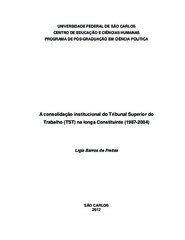Mostrar el registro sencillo del ítem
A consolidação institucional do Tribunal Superior do Trabalho (TST) na longa Constituinte (1987-2004)
| dc.contributor.author | Freitas, Lígia Barros de | |
| dc.date.accessioned | 2016-06-02T19:14:25Z | |
| dc.date.available | 2012-11-06 | |
| dc.date.available | 2016-06-02T19:14:25Z | |
| dc.date.issued | 2012-05-29 | |
| dc.identifier.citation | FREITAS, Lígia Barros de. A consolidação institucional do Tribunal Superior do Trabalho (TST) na longa Constituinte (1987-2004). 2012. 375 f. Tese (Doutorado em Ciências Humanas) - Universidade Federal de São Carlos, São Carlos, 2012. | por |
| dc.identifier.uri | https://repositorio.ufscar.br/handle/ufscar/952 | |
| dc.description.abstract | The objective of this thesis is to analyze the political performance of the Superior Labor Court (TST) and the Legislative Power in the context of changes to the Labor Law between 1987 and 2004. To reach this objective, we analyze the internal procedure of TST, classify the institutional changes factors responsible for altering the political performance of the TST in the course of the constituent process in the Constituent Assembly (ANC) during the 1987/1988 period, as well as in the constituent reform process in the Judiciary Power Reform (which gave rise to the Constitutional Amendment 24/1999 and Constitutional Amendment 45/2004). Likewise, these aspects of institutional change generated changes in the direction of jurisprudence and the policy of judiciary organization of the TST. In the ANC of 1987/1988, the political performance of the TST, which did not represent the Labor Court, returned to the constitutional articles of its structure and expertise, and attained little public visibility. In the Judiciary Power Reform, the TST started to participate in public hearings, increasing its public visibility and legitimizing itself as an outlet to represent the Labor Court when facing other powers, as well as about human rights issues related to employment. Therefore, this research reflects the support of the legislative model of labor relations in Brazil in the institutional consolidation process of the TST. | eng |
| dc.description.sponsorship | Universidade Federal de Minas Gerais | |
| dc.format | application/pdf | por |
| dc.language | por | por |
| dc.publisher | Universidade Federal de São Carlos | por |
| dc.rights | Acesso Aberto | por |
| dc.subject | Ciência política | por |
| dc.subject | Tribunal Superior do Trabalho (TST) | por |
| dc.subject | Assembléia Nacional Constituinte de 1987/88 | por |
| dc.subject | Reforma do Poder Judiciário | por |
| dc.subject | Legislativo | por |
| dc.subject | Superior Labor Court (TST) | eng |
| dc.subject | Constituent Assembly of 1987/1988 (ANC) | eng |
| dc.subject | Judiciary Power Reform, Legislative Power | eng |
| dc.title | A consolidação institucional do Tribunal Superior do Trabalho (TST) na longa Constituinte (1987-2004) | por |
| dc.type | Tese | por |
| dc.contributor.advisor1 | Noronha, Eduardo Garuti | |
| dc.contributor.advisor1Lattes | http://lattes.cnpq.br/6908348693613769 | por |
| dc.description.resumo | O principal objetivo da tese foi analisar a atuação política do Tribunal Superior do Trabalho (TST), junto ao Poder Legislativo, na alteração do Direito do Trabalho, entre 1987 a 2004. Para tanto, analisamos o funcionamento interno do TST, classificando os fatores de mudanças institucionais, responsáveis pela alteração de atuação política do TST, durante o processo constituinte da Assembléia Nacional Constituinte (ANC) de 1987/88 e no processo de reforma constitucional da Reforma do Poder Judiciário (que originou a Emenda Constitucional 24/1999 e Emenda Constitucional de 45/2004). Igualmente, esses fatores de mudanças institucionais provocaram alterações no direcionamento da jurisprudência e da política de organização judiciária do TST. Na ANC de 1987/88 a atuação política do TST, que não representava a Justiça do Trabalho, voltou-se para os artigos constitucionais sobre sua estrutura e competência e ganhou pouca visibilidade pública. Na Reforma do Poder Judiciário, o TST passou a participar de audiências públicas, ganhou maior visibilidade pública e legitimou-se como um dos porta-vozes para falar em nome da Justiça do Trabalho perante outros poderes, bem como sobre temas de direitos humanos relacionados com o trabalho. Com isso, o estudo apresenta o processo de consolidação institucional do TST e como o mesmo reforça o modelo legislado de relação do trabalho no Brasil. | por |
| dc.publisher.country | BR | por |
| dc.publisher.initials | UFSCar | por |
| dc.publisher.program | Programa de Pós-Graduação em Ciência Política - PPGPol | por |
| dc.subject.cnpq | CIENCIAS HUMANAS::CIENCIA POLITICA | por |
| dc.contributor.authorlattes | http://lattes.cnpq.br/1456376742053508 | por |
